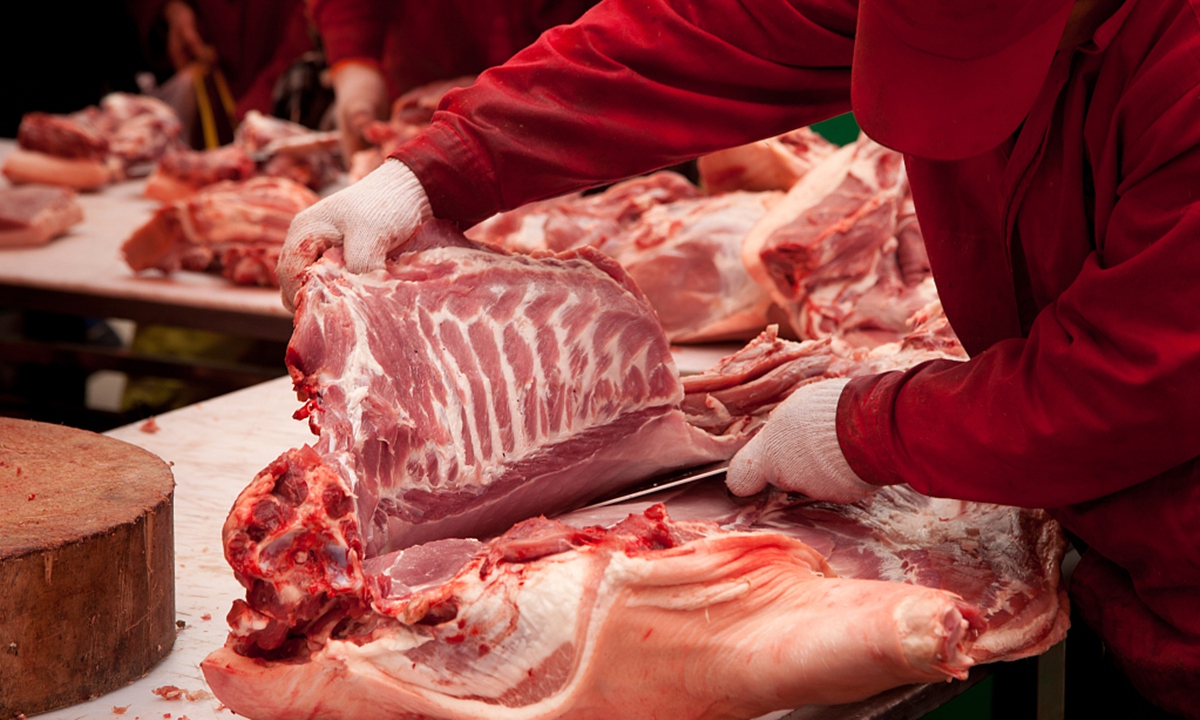
Pork Photo: VCG
Controversy surfaced after 24 households in Huanggang, Central China's Hubei Province were each fined 200 yuan ($30) for buying Brazil-imported frozen pork online.
The pork was considered problematic after a sample from the same batch tested positive for COVID-19.
Those who agreed with the punishment believe that individual customers should be more cautious as more and more imported frozen food products and their outer packaging have found traces of COVID-19. However, others remained skeptical about the punishment.
It is unknown when these consumers bought the pork, and if the online ordering and delivery platform they used, Meituan, which is being investigated by police, received the required permission or food safety certificate before putting the pork up for sale.
The positive test result of the same batch of imported pork was reported earlier on Tuesday to health authorities in Wuhan, the capital of Hubei, and 86 samples from people and 122 samples from the packaging were collected and tested within 48 hours. The packaging has also been thoroughly disinfected, according to a statement from the Huangzhou district of Huanggang city.
The 24 households are now required to pay for nucleic acid tests and remain quarantined in their homes. Local authorities in Huangzhou district of Huanggang city — where the residents live — have banned all purchases, storage and sales of imported frozen products since October 28.
Many netizens on Sina Weibo, however, said they believe, in this case, the consumers were innocent and victims to some extent. In fact, it is the platform Meituan that needs to be thoroughly investigated.
"The normal circulation of goods is protected by law. If the purchase of a certain kind of product is prohibited, the management of the case should begin with the seller," said a Weibo user.
Some netizens also pointed out that the punishment basis claimed by the local government, "Regulations on Public Security Administration and Punishment," was replaced on March 1, 2006 by the "Law on Public Security Administration and Punishment." The wrong use of the name of the law also made some netizens consider whether the government acted irresponsibly in handling the incident.
Zhi Zhenfeng, a legal expert at the Chinese Academy of Social Sciences in Beijing, told the Global Times that as long as consumers buy imported pork products through legal channels, there is no reason to punish them, suggesting that fining the 24 households was unnecessary.
However, some experts on the epidemic take a different view. Yang Zhanqiu, deputy director of the pathogen biology department at Wuhan University, told the Global Times that the move from Huangzhou district is understandable, as preventing the resurgence of the epidemic is a top priority of the local government, reflecting the government's awareness of preventive measures.
Yang said the risks of buying imported frozen food products from online and offline sources are almost the same, as they are related to the uncertainty of exporting countries' preventive measures.
Zhu Danpeng, a veteran of the food industry, told the Global Times that frozen imports may pose the greatest risk to additional COVID-19 outbreaks this winter. "It is vital to reduce imports. More importantly, stricter measures will have to be implemented."
Some netizens also worried that their local governments would follow the example set by the Huangzhou district--that is, banning the purchase of imported frozen meat and seafood, leading to higher prices.
East China's Hefei in Anhui Province announced on Monday that imported frozen food products that fail to provide a certificate of safety shall not be allowed for sale, and consumers shall register using their real names when buying imported frozen food.
Reporters have investigated many supermarkets and farmers' markets in Hefei and found although the merchants no longer sold imported frozen food, they said that they had not been notified of the above regulation.
A government official from Huanggang reached by the Global Times on Friday said that residents' lives have not been greatly affected, and confirmed the current policy requirements are limited only to the Huangzhou district.
Given China's huge food consumption, it would be unrealistic to stop pork imports altogether, said Yang, noting that the order of consumer consideration should be domestic fresh pork, imported frozen pork from offline sources, and online purchases.
He suggested that people should check the relevant imported food inspection and quarantine reports, disinfect food products' packaging and kitchenware, and to avoid eating raw food.
More than 40 cases related to imported frozen food products have been reported in at least 16 provinces and regions, leading to infections in North China's Tianjin and East China's Qingdao.



